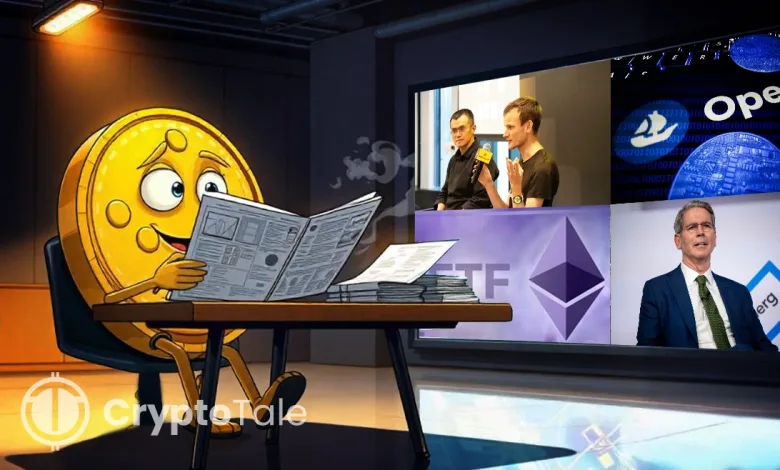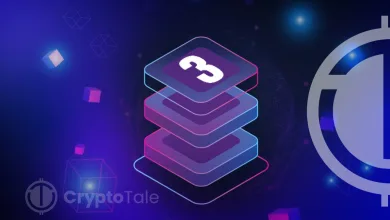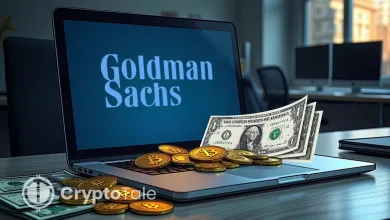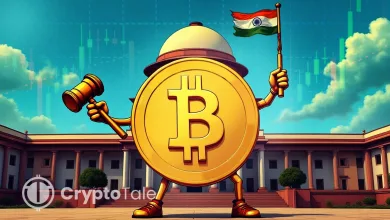The Blockchain Bulletin, Apr 11: Ethereum ETFs Get Options Trading Approval

Hey folks! Welcome to the latest edition of the Blockchain Bulletin, where we uncover the latest insights that hit the headlines in the past 24 hours. On April 9, 2025, the U.S. Securities and Exchange Commission (SEC) approved options trading for Ethereum spot ETFs, a move widely seen as expanding Ether’s exposure to traditional markets. The ETFs, filed by Nasdaq ISE (July 22, 2024) and NYSE (November 8, 2024), include BlackRock’s ETHA, Bitwise’s ETHW, Grayscale’s ETHE and ETH, and Fidelity’s FETH. These ETFs, already active since July 2024, can now support options contracts, enabling investors to hedge or amplify returns. This decision comes amid a growing appetite for regulated crypto vehicles.
Taking an innovative step, Changpeng Zhao proposed to provide $10 million to support Vitalik Buterin’s open-source vaccine initiative. The announcement came during the Hong Kong Web3 Festival, where the duo appeared at a Q&A for the BNB Chain’s MVB Accelerator Season 9. The pledge underscored a deeper conversation about blockchain’s relevance in solving non-financial global challenges such as public health.
On the other hand, Binance’s BPay Global became the first of its group to secure a Payment Service Provider (PSP) license from the Central Bank of Bahrain. The license enables fiat deposits, withdrawals, custody, and e-wallet solutions, allowing Binance users to transact using credit cards and wire transfers—a major step in fiat-crypto integration.
Related: Paul Atkins Takes Charge of SEC After Senate Confirmation
Meanwhile, Pakistan is eyeing Bitcoin mining to repurpose surplus electricity from underutilized energy infrastructure. Bilal Bin Saqib, chair of Pakistan’s Crypto Council and advisor to the Finance Minister, confirmed that the government is in talks with mining firms. Further, he stated that the location for the new center will be based on power availability. With regions now producing more solar power, officials hope to create value through crypto and AI data centers. Also, this initiative aligns with Pakistan’s broader goal to become a hub for emerging tech.
On the political front, Scott Bessent announced plans to review regulations concerning blockchain and stablecoins. Speaking at the American Bankers Association event, Bessent confirmed the administration’s intent to eliminate barriers to innovation, following Trump’s deregulation strategy. This effort reflects a policy shift aimed at reducing compliance pressures while welcoming blockchain innovation.
The tech world witnessed a dramatic legal escalation as OpenAI countersued Elon Musk. Filed on Wednesday, the lawsuit accused Musk of harassment, manipulation, and attempts to seize control of OpenAI. Musk, who co-founded the company in 2015, exited in 2018 and launched xAI, a rival in the artificial intelligence sector. This legal battle signals a deeper rift between pioneers who were once aligned on the future of AI.
Related: China and Russia Use Bitcoin for Energy Trade Settlements
To integrate cryptocurrencies into real-world systems, the World Food Program USA announced it would accept crypto donations via The Giving Block. Donations in Bitcoin, Ethereum, and USD Coin will support relief efforts across one hundred and twenty countries. The move represents a change in fundraising strategy in light of rising global hunger.
On the NFT Marketplace, OpenSea requested the U.S. Securities and Exchange Commission (SEC) to provide better clarity on its regulatory guidelines. The firm emphasized that since it does not provide any broker services or associate with trading, the definition given by the securities exchange does not comply with its structure. This request comes on the heels of the SEC putting to bed its investigation of various crypto firms, including OpenSea.




